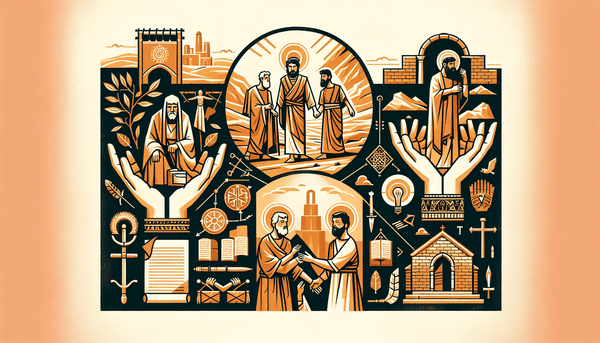Salvation Through Jesus Christ
According to the book of John, Jesus makes a bold and exclusive claim: \"I am the way and the truth and the life; no one comes to the Father except through me\" (John 14:6). This statement is the cornerstone of Christian soteriology, emphasizing that faith in Jesus Christ is the sole avenue to reconciliation with God and the promise of eternal life. The process of this salvation is not simply a momentary declaration but a transformative journey. It begins with the acceptance of Jesus' sacrificial death and resurrection, continues through repentance and often baptism, and manifests in a life that strives to reflect the principles and love of Christ. Believers are assured of their salvation and the hope of paradise, a promise echoed in the cherished words of John 3:16 and reaffirmed in passages like Romans 10:9-10, Ephesians 2:8-9, and 1 John 5:11-12, which collectively underscore the gift of eternal life through belief in the Son of God.
Understanding the Trinity
The Christian doctrine of the Trinity is a complex and divine mystery, capturing the unity and diversity within the Godhead. It describes one God in three distinct persons: the Father, the Son, and the Holy Spirit. These persons are co-equal and co-eternal, each fully God, yet there is only one God. This concept challenges human logic, yet it is a foundational truth of Christian theology. The roles of the Trinity are distinct but harmonious, not a hierarchy but a divine collaboration. The Father initiates creation and redemption; the Son accomplishes it; the Holy Spirit applies it. In this divine dance, we see a reflection of perfect love and unity, exemplified in Jesus' own submission to the Father's will—a model for believers' lives. This unity is articulated in scriptures such as John 10:30, Philippians 2:5-6, and John 17:21-22, and the Great Commission in Matthew 28:19 invites believers to baptize in the name of the Trinity, revealing the interwoven roles of the Godhead.
Submitting to God and Resisting the Devil
The epistle of James provides succinct yet profound guidance for believers: \"Submit yourselves, then, to God. Resist the devil, and he will flee from you\" (James 4:7). To submit to God is to align one's desires and decisions with His will, acknowledging His sovereignty and our dependence on Him for anything of eternal value. This submission is not passive but an active trust in God's protection and provision. Conversely, resisting the devil is the active stance against the temptations and lies that seek to derail us from our divine purpose. It is a battle that requires the armor of faith, the sword of the Spirit, and the authority of Jesus Christ. The promise is clear: as believers stand firm in their faith, the devil has no choice but to flee. For a deeper understanding of spiritual warfare and divine mysteries, consider exploring the narratives of biblical figures and prophetic insights. The scriptures provide further guidance on this spiritual discipline in Ephesians 6:11-12, 1 Peter 5:8-9, 1 John 4:4, and 2 Corinthians 10:3-5, encouraging believers to remain vigilant and rooted in Christ.
Conclusion
This exploration of the fundamental Christian beliefs has traversed the exclusive claim of Jesus as the path to salvation, the mysterious unity of the Trinity, and the essential practice of submitting to God while resisting the devil. Reflecting on these truths can deepen our relationship with God and strengthen our spiritual resolve. For a more comprehensive understanding, it's crucial to engage with spiritual mentors and immerse oneself in the profound wisdom of Scripture, as discussed in our related exploration on the significance of daily prayers, scriptural wisdom, and heavenly rewards. May our journey be marked by a growing faith and a steadfast commitment to living out these eternal truths.
FAQ
Q: How does one attain salvation according to Christian belief?
A: Salvation is attained through faith in Jesus Christ, by accepting His sacrifice for sin and His resurrection, and by living a life in accordance with His teachings and commandments.
Q: What is the significance of Jesus' statement in John 14:6?
A: Jesus' statement in John 14:6 indicates that He is the exclusive way to access the Father, underscoring the belief that no one can come to God except through faith in Jesus Christ.
Q: Can you explain the concept of the Trinity?
A: The Trinity is the Christian doctrine that defines God as three distinct persons — The Father, the Son (Jesus Christ), and the Holy Spirit — who are each fully God, yet there is one God. This unity and diversity within the Godhead is a divine mystery central to Christian faith.
Q: What does it mean to submit to God and resist the devil?
A: To submit to God means to align with His will and authority, relying on Him for guidance and strength. Resisting the devil involves standing firm against temptations and spiritual attacks, with the promise that doing so will cause the devil to flee.






